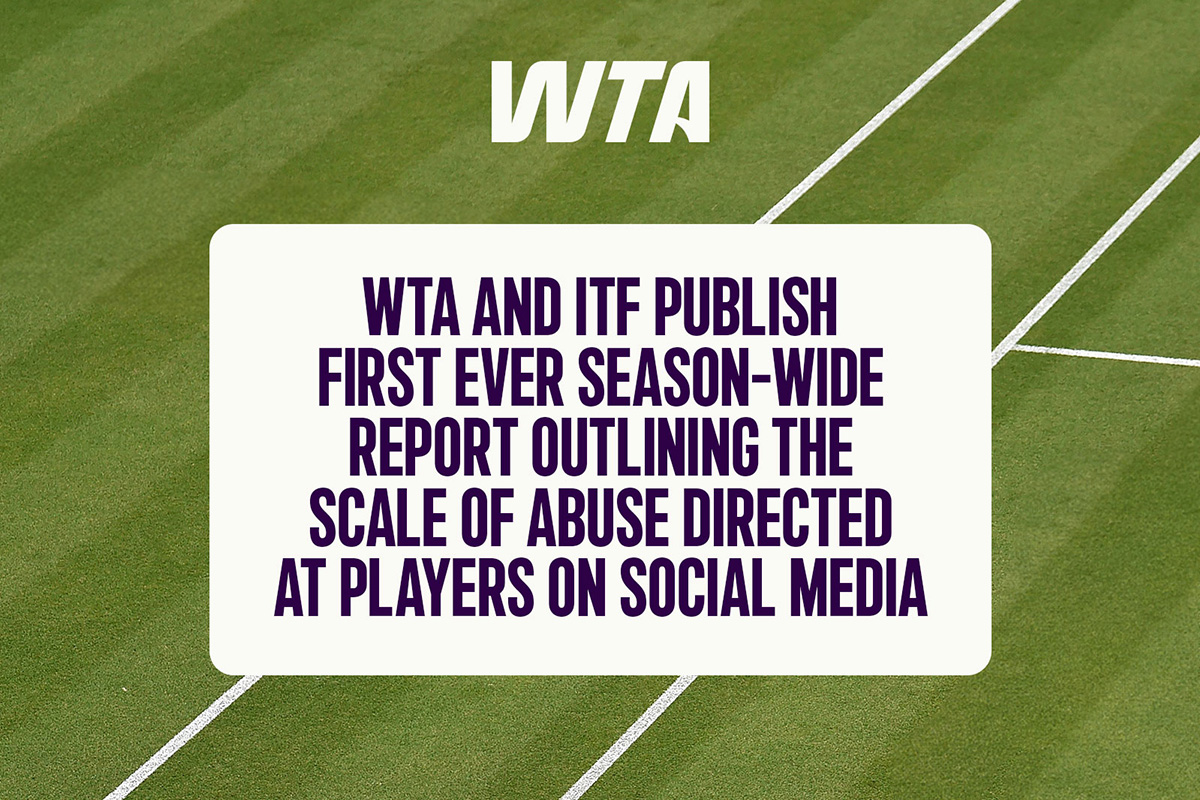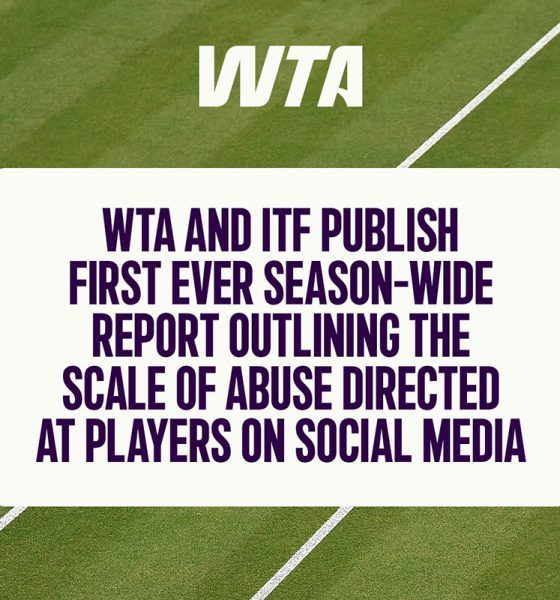

Compliance Updates
WTA and ITF Publish Season-wide Online Abuse and Threat Report
The Women’s Tennis Association (WTA) and International Tennis Federation (ITF) published the first-ever season-wide report outlining the scale of abuse directed at players on social media — and are calling on the gambling industry to more effectively tackle those responsible.
The report findings are taken from Signify Group’s Threat Matrix service, which went live in January 2024, protecting players and tennis family members from targeted online hate, as well as threatening and violent direct communication. Utilising AI and human analysts — including risk and fixated threat assessment experts — the service operates across all the major social media platforms in over 40 languages. All players competing in WTA Tour and ITF World Tennis Tour events (and WTA and ITF players competing in the four Grand Slams) — c8300 players — are automatically covered by the service.
Between January to December 2024,1.6 million posts and comments were analysed by Threat Matrix AI. Analysts then verified c8000 posts/comments sent from 4200 accounts as abusive, violent or threatening. Action has been taken against the most serious and prolific of these, including 15 accounts escalated to law enforcement. During the year, 458 players were targeted with direct abuse or threat, five players received 26% of the total abuse identified, while 97 prolific accounts were responsible for 23% of all detected abuse.
Given the evidence highlighted by Threat Matrix, the tennis bodies now call for a constructive dialogue with the gambling industry to tackle the individuals that engage in prolific or highly threatening online abuse connected to sports betting.
Prolific Abuse and Angry Gamblers
• Angry gamblers sent 40% of all detected abuse across the year
• 10 prolific accounts [majority being angry gambler related] were responsible for 12% of all abuse — of these, nine have either been suspended, posts permanently deleted by the platform or the user has removed their post(s)
• Details of 39 account holders (majority angry gambler related) who sent prolific abuse have been shared with the tennis authorities and betting industry for further action
• The most prolific abusive account sent 263 abusive messages.
Action
• 15 cases of egregious and highly threatening abuse have been investigated and evidence provided to law enforcement for assessment and action — four related to Grand Slams, one from the Paris Olympic Games and 10 were from across the tours
• Of the 15 cases, three have been submitted to the FBI and 12 to other national law enforcement bodies
• Relevant account details have been shared with event security teams (both Tours and Grand Slams) to ban these individuals from access to venues and rescind tickets. This has also included threats to men’s and women’s players detected by Threat Matrix during Grand Slam events.
Direct Abuse Communication Support
The Threat Matrix service also includes support for players who receive direct abuse, threat and inappropriate communication via DMs, email and letter. Players use a designated email address to share relevant content, enabling Threat Matrix to conduct threat assessment, provide direct player advice and liaise with security bodies to manage risk.
During 2024, 56 reports of concerning communication were received from 28 players, the vast majority coming in the final quarter of the year due to heightened awareness of the service. Angry gamblers made up the vast majority of direct abuse (77%) — at a higher level compared to open-source social media (40%) — as abusers seek to cause direct emotional distress to players following lost bets. Player reported direct abuse has continued to rise in 2025 as players and agents become more aware of the support service.
Social Media Moderation
To further reduce hateful and abusive content targeting players, the WTA and ITF are also enhancing the existing Threat Matrix service to include social media moderation. Moderation allows online toxicity to be hidden or removed in real time across the majority of Social Media platforms. The service will automatically deploy across WTA and ITF official social media channels and be available to all tour players on request. The service will go live in the coming weeks.
A spokesperson for the WTA and ITF said: “Protecting players and the wider tennis family from vile online threat and abuse is a key priority for us. Today’s report covering the first year of the Threat Matrix service shows the scale of the problem and, crucially, the actions being taken to protect our athletes. From law enforcement escalation and platform intervention to banning abusers from our events, perpetrators must understand that they will face consequences for their actions.
“Given the clear evidence highlighted by Threat Matrix on the link between angry gamblers and prolific online abuse and threat, we are calling for a constructive dialogue with the gambling industry to help tackle this issue. Everyone — betting operators, social media platforms, governing bodies, players and law enforcers — has a responsibility to make the online space a safer and more positive one. We hope the gambling industry responds constructively to our call for more action on their part.”
Jessica Pegula, Member of the WTA Players’ Council, said: “Online abuse is unacceptable, and something that no player should have to endure. I welcome the work that the WTA and ITF are doing with Threat Matrix to identify and take action against the abusers, whose behavior is so often linked to gambling. But it’s not enough on its own. It’s time for the gambling industry and social media companies to tackle the problem at its source and act to protect everyone facing these threats.”
Jonathan Hirshler, CEO of Signify Group, said: “This unique dataset, covering all players across international tennis tours and Grand Slams, illustrates that a relatively small number of accounts are responsible for a significant proportion of prolific abuse and trolling. While this is deeply distressing for the athletes targeted, it means that we are able to be even more focused working with the platforms to ensure successful take down, support the tennis bodies to drive law enforcement intervention for the most egregious accounts and work with event security teams to ensure prolific abusers are unable to attend tournaments. This action-orientated approach underpins the Threat Matrix service.”
The post WTA and ITF Publish Season-wide Online Abuse and Threat Report appeared first on European Gaming Industry News.
Compliance Updates
Nevada Rep. Dina Titus to Add FAIR BET Act to 2026 Defense Budget

Nevada Rep. Dina Titus is strategically pushing forward her Fair Accounting for Income Realized from Betting Earnings Taxation Act, commonly known as the FAIR BET Act. She intends to attach it to the 2026 National Defense Authorization Act (NDAA), a key piece of legislation that must pass annually. This maneuver, revealed on August 27, is designed to increase the chances that her proposal will be enacted into law.
The FAIR BET Act seeks to reverse a disputed provision introduced under former President Donald Trump’s One Big Beautiful Bill Act. The provision lowered the gambling loss deduction from 100% to 90%, which is set to take effect in January 2026. This change has met significant resistance from both the gaming industry and individual gamblers, who argue that it unfairly taxes money that they never actually won.
Representative Titus, who co-leads the Congressional Gaming Caucus, initially introduced this succinct bill in July. However, it stalled in the House Ways and Means Committee. To overcome this hurdle, she is leveraging a common legislative tactic by attaching the amendment to the NDAA. Around two decades ago, a similar strategy helped pass the Unlawful Internet Gambling Enforcement Act amid a port security bill.
The initiative enjoys strong support from major gaming industry leaders and state officials. Prominent executives from companies such as MGM Resorts, Caesars, and Wynn Resorts have expressed concern to lawmakers about the financial impact this deduction limit could have on both players and casinos. The American Gaming Association has also condemned the recent tax rule, stressing that it unfairly penalizes a legal and regulated industry.
The FAIR BET Act is gaining momentum across party lines. So far, ten members in the House have endorsed it as co-sponsors. In addition, a Republican counterpart titled the WAGER Act was introduced in July by Representative Andy Barr of Kentucky. In the Senate, Nevada Senator Catherine Cortez Masto has proposed a similar measure known as the FULL HOUSE Act.
Supporters emphasize the importance of this amendment for states like Nevada, where gambling significantly contributes to the economy. However, some critics argue that inserting tax policy changes into a defense authorization bill represents an overreach by lawmakers.
The amendment is currently under review by the House Rules Committee, with a vote expected within the next several weeks.
The post Nevada Rep. Dina Titus to Add FAIR BET Act to 2026 Defense Budget appeared first on Gaming and Gambling Industry in the Americas.
Compliance Updates
Romania Blocks 30 Unlicensed Gambling Websites

Romania’s gambling authority, the ONJN, has blacklisted 30 gambling websites after finding they were offering online casino and sports betting without local licences. Internet service providers (ISPs) now have 15 days to cut access, redirecting users to an official ONJN page explaining the block.
The 30 blocked sites range from obscure names to platforms that had been attracting steady traffic. Domains include wazbee.casino, jacktop.com, roostake.com, a string of “nv” branded casinos (nv5.casino through nv93.casino), and several under the ybets label.
Some of these platforms appeared almost overnight and marketed heavily on social media. Others had been active for months, drawing Romanian players with offers that licensed brands simply cannot match under current advertising rules.
The ruling obliges Romanian ISPs to redirect any traffic from the blacklisted domains to a designated ONJN IP address. Players trying to access those sites will instead see a page confirming the operator is not authorised to operate in Romania.
The post Romania Blocks 30 Unlicensed Gambling Websites appeared first on European Gaming Industry News.
Asia
New Indian Law Aims to Curb Online Money Gambling Sector, Prohibits Related Advertising

Following the passage of the Promotion and Regulation of Online Gaming Bill 2025 on August 21, the government of India imposes a complete ban on online money games, alongside the advertisements related to the sector.
Passed by the parliament, any financial transactions related to these platforms would be considered unlawful as stated under the Information Technology Act of 2000. The legislation also aims to establish a national-level regulatory authority that will govern the categorising and registration of online games.
The said authority shall issue guidelines, codes of practice and directions for compliance, with strict punishments induced, leading to imprisonment for up to three years, and a fine to one crore rupees or 114,017 USD.
The advertisement of the said games is also punishable with similar penalties, with imprisonment up to two years and a fine of up to fifty lakh rupees 1140 USD.
While the law prohibited online money gaming such poker, rummy and fantasy sports that offer cash rewards, e-sports are considered and recognised as a legitimate competitive sport in India, and is not included in the total ban, as well as online social games or casual games that are recreational in nature.
This draws that the bill-turned-law, used a “balanced approach” since recognising that the online gaming sector is one of the most dynamic segments in the digital and creative economy, hence, still allowing esports and online social games.
This came after the report of over 45 crore or 45,000,000 people were reportedly affected by online money games and have lost more than Rs. 20,000 crores or 2,280.414 USD, according to Shri Ashwini Vaishnaw, Union Minister for Electronics and Information Technology.
According to the same ministry, the total ban was driven by the following reasons:
• Addiction and Financial Ruin
• Mental Health and Suicide
• Fraud and Money Laundering
• Threat to National Security
• Closing Legal Loopholes
• Encouraging Healthy Alternatives
Meanwhile, the bill also stated that while the online gaming authority governs the registration of online games, the central government still has the authority to frame the rules for the promotion and advertisement of e-sports, online social games and other rules related under the law.
In total, the legislation aims to safeguard vulnerable populations, particularly the middle class and youth by introducing these strict regulations and a greater emphasis on brand responsibility and ethical advertising.
The post New Indian Law Aims to Curb Online Money Gambling Sector, Prohibits Related Advertising appeared first on European Gaming Industry News.
-

 gaming3 years ago
gaming3 years agoODIN by 4Players: Immersive, state-of-the-art in-game audio launches into the next generation of gaming
-
EEG iGaming Directory8 years ago
iSoftBet continues to grow with new release Forest Mania
-
News7 years ago
Softbroke collaborates with Asia Live Tech for the expansion of the service line in the igaming market
-
News7 years ago
Super Bowl LIII: NFL Fans Can Bet on the #1 Sportsbook Review Site Betting-Super-Bowl.com, Providing Free Unbiased and Trusted News, Picks and Predictions
-
iGaming Industry8 years ago
Rick Meitzler appointed to the Indian Gaming Magazine Advisory Board for 2018
-
News7 years ago
REVEALED: Top eSports players set to earn $3.2 million in 2019
-
iGaming Industry8 years ago
French Senator raises Loot Boxes to France’s Gambling Regulator
-
News7 years ago
Exclusive Interview with Miklos Handa (Founder of the email marketing solutions, “MailMike.net”), speaker at Vienna International Gaming Expo 2018










